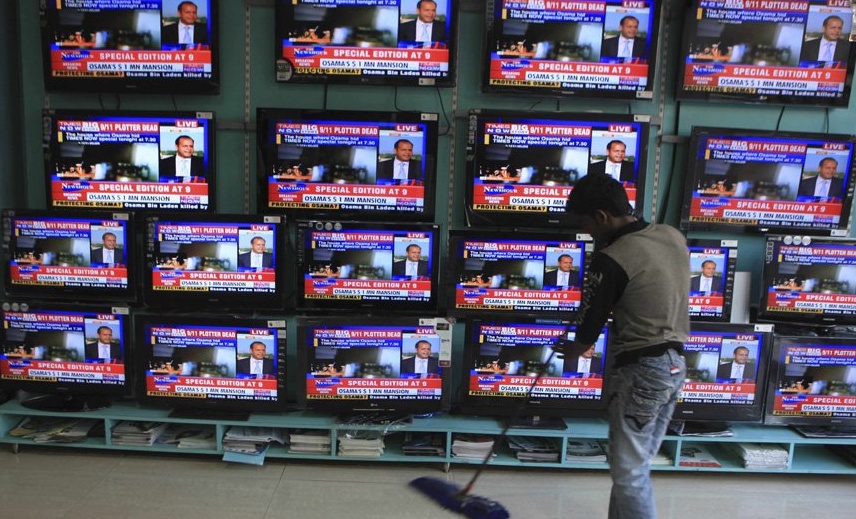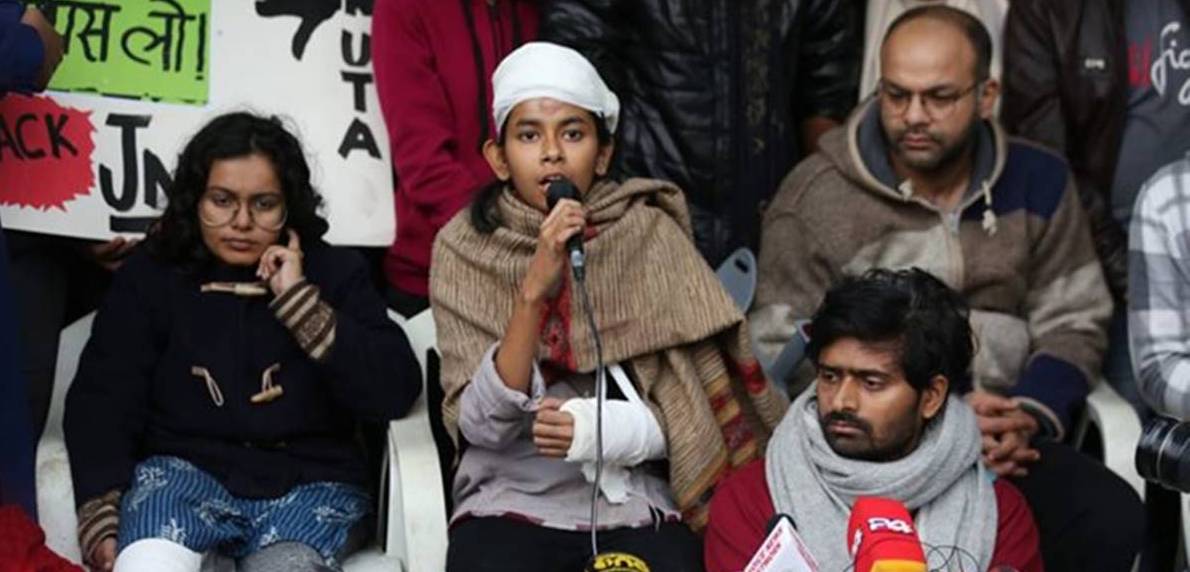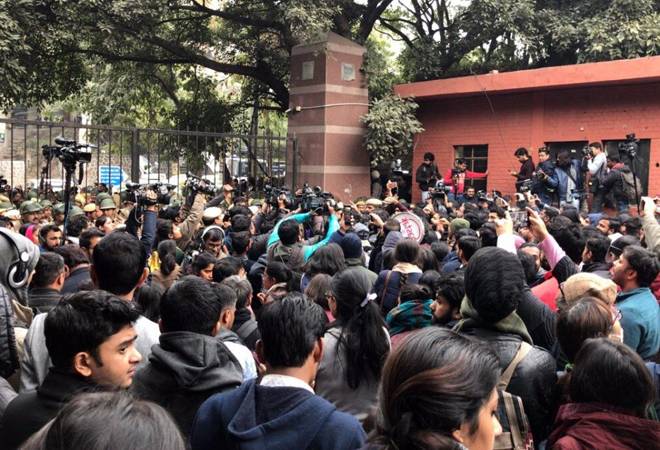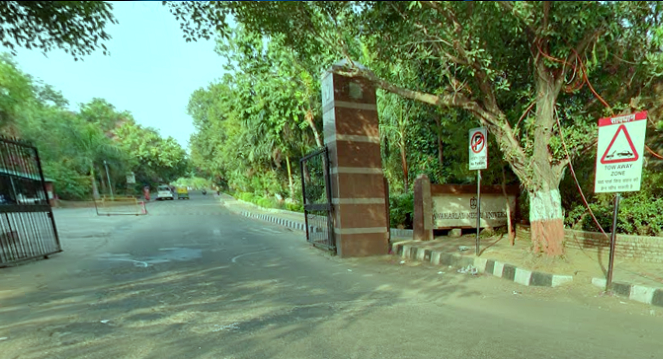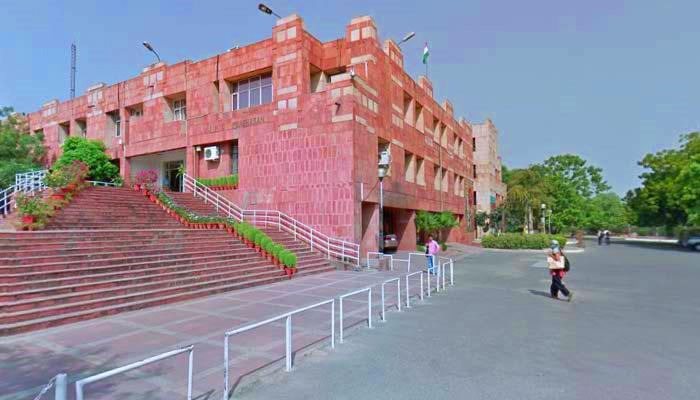In this passionately argued brief piece, the author has warned us of the hollowness of most of our television news channels; its consequences, as he has pointed out, can prove to be disastrous.
Prof. Avijit Pathak teaches at the Centre for the Study of Social Systems, Jawaharlal Nehru University, New Delhi.
It is becoming increasingly difficult to watch television news channels. Is it that in this era of ‘post-truth’ everything is falsified, and visual spectacles with aggression and performance are allowed to invade our existence? Even if some of us refuse to indulge ourselves with the ‘prime time’ dramaturgical show, the irony is that in this fast world of instantaneity, for many, television seems to have become the prime educator. It is terribly dangerous; it is a move towards the making of a non-thinking/non-reflexive/authoritarian society.

The superficiality of the medium
To begin with, it is important to reflect on the medium itself. As crafted visuals, shifting camera angles, instrumental use of soundtrack and ‘live coverage’ characterize the mode of television journalism, something tends to happen in the process of dissemination of ‘news and events’. The rigor of a printed story of fifteen hundred words is now replaced by catchy visuals and a set of bullet points uttered loudly by glamourized newsreaders or celebrity television anchors. This is a move from substance to sensationalism, from critical thinking to passive watching. With the constant flow of ‘breaking news’ and sensational images, we see yet another metamorphosis: from an engaged/contemplative reader to a passive consumer of colourfully packaged visual spectacles—from the Prime Minister’s election rally to Virat Kohli’s century, from the outbreak of fire in a Mumbai slum to the burning valley in Kashmir. As a result, three things happen.
First, as social philosopher Zygmunt Bauman said, in the era of ‘liquid modernity’ everything seems to be fleeting, and we lose depth, entertain a ‘surfing attitude’ (nowhere do we concentrate, with a remote in our hands we move from one channel to another in search of yet another sensation, another piece of ‘breaking news’), and lose the faculty of concentration and alertness.
Second, as Jean Baudrillard—the postmodern French thinker—reminded us, television spectacles are taking us to a ‘hyper-real’ world: a world in which there is nothing substantially real anymore, and constructed images tend to be more real than the real. Imagine what you are asked to see as the ‘real’—Mr. Narendra Modi addressing an election rally in a dusty ground, or a visually constructed (by hundreds of editors, camera persons in the equipped studio) Prime Minister appearing on the glossy screen in your drawing room!
Third, many television journalists tend to lose the spirit of background research and critical education. With a cameraman, you go anywhere—a turbulent university, a Durga puja pandal, a protest rally; choose a couple of individuals to speak something, and then you make a set of quick points that will get not more than thirty seconds on the screen. Where is the possibility of background research, serious thinking and penetrating observation? Possibly, the very nature of the medium tends to promote superficiality. This is not my contention to say that all television journalists are superficial. In fact, I have seen some who, despite the constraints, do a brilliant job. What I am trying to indicate is the dominant trend. How can we deny it?
No ethics, only propaganda machinery
A nexus of corporate capitalism and the ruling class ideology seems to have severely damaged the quality and ethics of most of the big news channels. The irony is that this ‘grand consensus’ (Mr. Modi is necessarily always right; the role of the army is naturally good for restoring the ‘unity’ of the nation, eliminating the ‘Islamic terrorism’ in Kashmir, and giving due lessons to the Pak soldiers who dare to cross the border; the economy is fine, and in the ‘long run’ the moves like demonetization and GST will give miraculous results; Hindutva is the national philosophy, and those who question it—JNU students or left/liberal intellectuals— are essentially ‘anti-national; and the likes of Rahul Gandhi are too dumb to pose any challenge to ‘charismatic’ Mr. Modi) is taken for granted, and bombarded on us every evening. Yes, there will always be a democratic pretense; ‘leftists’, ‘rightists’ and ‘centrists’ will be invited in these panel discussions.
However, the loud voice of the narcissistic anchor will generate noise; and the possibility of any nuanced argumentation will be ruthlessly eliminated. Even academicians who are invited are asked to sit idle; and their voices are overshadowed because of the stereotypical responses by the likes of Mr. Sambit Patra. It is sad and ugly. Imagine the way in recent times two news channels interviewed Mr. Modi. Is it journalism? Is it critical enquiry? The journalists who are never tired of shouting at the ‘anti-Modi lobby’ behaved like submissive/masochistic/docile servants. No critical question. No interrogation. No reflection on social inequality, heightened violence, mob mentality, joblessness and social insecurity. This is a dangerous trend. This invites and promotes authoritarianism. Yes, amidst multiple television channels we are living in a potentially authoritarian society.
Ours is also a society that has destroyed the spirit of liberating education. Schools with rote learning and technical institutions with mere job-oriented ‘skill-based education’ are incapable of nurturing a reflexive mind that has the critical faculty to filter, distinguish truth from propaganda, image from reality, critical analysis from ideologically charged perception, real issues of concern from paid news. For many of them—intoxicated with smartphones, gadgets and instant shopping for conspicuous consumption—good books do not exist, and no windows are open for fresh creative ideas to illumine their deserted souls. Television, for them, seems to have become the sole educator and entertainer. Possibly, in our times fascism will come with smartphones, television channels, and fancy media celebrities. Be aware.
The New Leam has no external source of funding. For retaining its uniqueness, its high quality, its distinctive philosophy we wish to reduce the degree of dependence on corporate funding. We believe that if individuals like you come forward and SUPPORT THIS ENDEAVOR can make the magazine self-reliant in a very innovative way.

